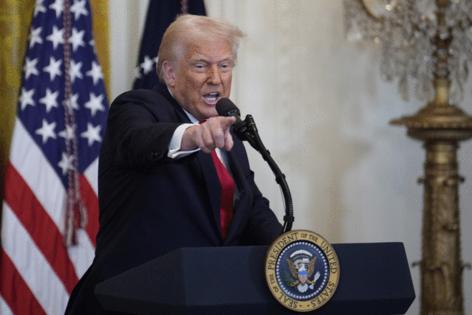Pa. experts say Trump's executive order on elections is dangerous, but unlikely to take effect
Published in Political News
PHILADELPHIA — Pennsylvania election officials and experts said Wednesday that it’s highly unlikely a sweeping executive order from President Donald Trump seeking to require proof of citizenship for voters and altering rules for administering elections will take full effect.
And at least one Philadelphia area county said it is consulting attorneys about a possible legal challenge.
After spending years making false claims about election fraud and rampant non-citizen voting, Trump issued an executive order Tuesday imposing new proof of citizenship requirements for voters, directing the federal Election Assistance Commission to decertify certain voting machines and withholding federal funds from states that fail to comply and provide certain information to federal agencies.
Within hours of the news, voting rights advocates vowed to sue, arguing the president had no authority to unilaterally alter state and local voting laws.
The Pennsylvania Department of State echoed that sentiment in a statement Wednesday while noting the agency was still reviewing the order. “The Shapiro Administration is committed to ensuring appropriate federal laws regarding election administration are followed but a president cannot overrule established federal legislation and our bipartisan state election laws via executive order,” the statement said.
As state and local officials continued reviewing the order Wednesday, Neil Makhija, the chair of the Montgomery County Board of Commissioners, said he was in touch with county attorneys.
“There’s no question this is going to be challenged by us and others around the country,” Makhija said, though he stopped short of saying the county was planning to file a lawsuit.
Marian Schneider, an attorney with the ACLU of Pennsylvania, said it is all but certain the executive order will be tied up in court and shot down.
“It’s going to have very little impact on Pennsylvania elections. It’s going to be tied up in court for a while,” Schneider said. “The president has zero authority over elections under the U.S. Constitution.”
Proof of citizenship
Under federal and state law, it is illegal for non-citizens to vote in Pennsylvania elections. When registering to vote, Pennsylvania voters must mark a box verifying that they are U.S. citizens and eligible to vote.
Lying on that form, and voting without citizenship, can result in criminal prosecution and deportation. Studies have found that instances of non-citizens voting are extremely rare.
Despite this, Trump spent much of his presidential campaign falsely claiming that undocumented immigrants would vote en masse in the presidential election. Republicans in Congress have proposed legislation that would require every voter provide documents proving their citizenship when registering to vote.
The messaging was a continuation of a long string of election misinformation from Trump, who narrowed in on Pennsylvania in 2020 with false claims that the election had been stolen from him.
Trump’s executive order directed the EAC to add a requirement for documentation proving citizenship to its national mail voter registration form. Citizenship could be proved using a passport, a REAL ID, or a military ID card.
Advocates have long raised concerns that such requirements may inadvertently disenfranchise eligible voters who struggle to access the required documents, especially those whose legal name no longer matches the name on their birth certificate, including people who change their last names when they get married.
“He’s trying to hammer in a fake nail with a sledgehammer and in doing so is going to hurt everyone who’s under it,” said Adam Bonin, an election attorney who has represented Pennsylvania Democrats.
The potential change to the form, however, may impact only a fraction of Pennsylvania voters as the state has its own voter registration form. Kathy Boockvar, the former Pennsylvania Secretary of State, said that, historically, requirements for the federal form hold no bearing on the state form.
Impacts to election administration
Makhija said one of his biggest concerns with the order was the broad effort to impose national control over an election system that is decentralized by design.
“If you want to rig an election you would need to essentially federalize the election process,” Makhija said. “If this EO actually stood up in court it would be a step towards doing that.”
In addition to imposing proof of citizenship rules, the executive order requires states to share information with several federal agencies including Elon Musk’s Department of Government Efficiency, it orders the EAC to decertify certain election machines and it says the federal government will take certain steps to help states identify ineligible voters.
It also seeks to block states from counting ballots that arrive after election day, which would eliminate Pennsylvania’s grace period for military and overseas ballots.
Boockvar, the former Pennsylvania Secretary of State, said the executive order expects certain actions to happen far quicker than is possible and seems to lack an understanding of how voting machines work.
Depending on how the sections on decertifying voting machines is interpreted, she said, 90% of the voting machines in the country could be invalidated. It could also be much fewer.
“The people who drafted this plain and simple don’t understand that these take time, they take funding, and it’s very unclear, at this point, which systems are even covered,” Bookvar said.
Karen Barsoum, the elections director in Chester County, said she didn’t think the executive order would ultimately hold a large impact for individual counties.
Much of the order, she said, pertains to state level voter roll maintenance and reinforces existing laws and policies on voter roll maintenance and prohibiting non-citizen voting. She said she hoped some of the federal information sharing may make it easier to remove dead or otherwise ineligible voters from the rolls.
“After reading it I felt pretty good where things are,” Barsoum said.
_____
©2025 The Philadelphia Inquirer. Visit inquirer.com. Distributed by Tribune Content Agency, LLC.




























































Comments